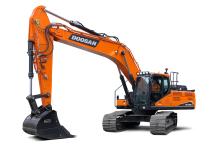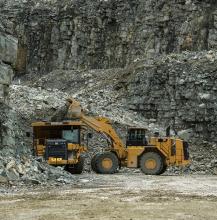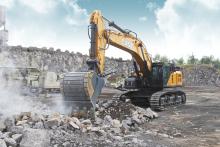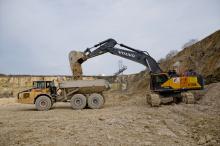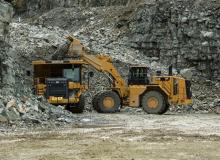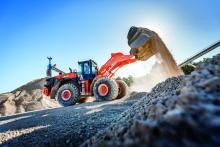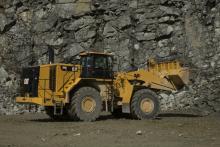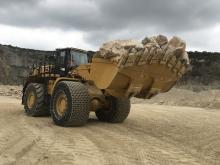
A Hitachi wheeled loader is helping to drive production in a market where limestone can be more profitable than marble. Liam McLoughlin reports
A Portuguese limestone supplier has added a Hitachi ZW310-6 wheeled loader to its fleet to help it maintain high productivity levels at its quarry near the town of Fátima.
The Filstone Natural quarry was established in 2002 by CEO Ricardo Jorge and produces 900,000 tonnes of material per year at the 30-hectare site.
The
Jorge said that the Hitachi vehicle is essential to Filstone’s output, especially in a market in which limestone can sometimes be more lucrative than marble.
“We had high expectations for the wheeled loader, but were surprised by its low fuel consumption,” Jorge said. “In addition, the machine is stable and compact, and still performs as effectively as a larger machine.”
At the family-owned company, Jorge’s cousin Humberto Miguel de Jesus Santos operates the ZW310-6. He praised the loader’s “rapid, agile and smooth” performance. “Inside the cab there is near 100% visibility and it is very quiet,” he added. “In terms of maintenance, it has well-positioned access points and is easy to clean.”
At April’s
The project is intended to enable a shift away from the traditional reliance on diesel engines. The concept includes a methane-powered engine, specially designed and developed for construction applications by
Case says the technology already exists, with FPT having already produced 40,000 engines using natural gas, but this is the first time it has been used in earthmoving.
“We plan to bring it to market in a few years,” said Massimiliano Ventura, product manager for wheeled loaders, Case Europe. “It’s still in the early development stage, but there was a lot of interest from the reveal at bauma.”
Carl Gustaf Goränsson, president of construction at CNH Industrial, added: “This technology is already tried and tested in other CNH Industrial brands as there are some 28,000 methane-powered
Case is seeking to challenge the established European players in the loading sector and build its market share. Asked about the company’s targets in the wheeled loader/excavator market in Europe, Alain de Nanteuil, product director, general construction at Case CE Europe, responded: “Becoming among the first choices for heavy equipment and being at the front of customers’ minds when they are making these decisions.”
He added that aggregates customers are looking to make their production more efficient and want to cut down their fleet costs without compromising their output. “Moreover, climate change is becoming a major concern globally and heavy-line customers need solutions/products that are not yet available on the market,” de Nanteuil said. He added that Case will address all those needs, leveraging strongly on alternative energies, automation and digitalisation.
In July Case showcased a range of its loaders, dozers and excavators at the 500-acre Maltby Colliery site in South Yorkshire, England.
Equipment on display at the CASE Eagle Days press and customer events held on 15-1 6 July included the 721GXR, 821G and 1121G wheeled loaders; the 1650, 1850 and 2050 dozers (both fitted with
CASE Construction Equipment is upgrading the engines on its vehicles to meet the Stage V exhaust emission legislation for off-road engines. The first stage of the European Union legislation came into effect in January 2019 for engines below 56 kW as well as engines of 130 kW and above. From January 2020 it will apply for engines from 56 kW but below 130 kW.
“We will upgrade our engines to be Stage V-compliant by 2020 on all our machines in Europe, including loaders and excavators,” said Ventura.
The newly launched Doosan DX300LC-7 30 tonne model – used in the construction and demolition sectors – is the company’s first mid-sized Stage V crawler excavator. It is now being joined by the 36 tonne DX350LC-7 model – suitable for construction, demolition and small quarries – which is available to European customers from October.
Stage V ‘-7’ models of the rest of the crawler excavator range are due to be available by June 2020, according to Stephane Dieu, excavator product specialist and sales trainer for Doosan Infracore Construction Equipment EMEA.
The range covers the 40 tonne DX380LC-7 (due to be available to European customers in Q1 2020), in addition to the larger DX420LC-7, DX490LC-7 and DX530LC-7 machines which are suitable for quarrying. These models will have the same improvements as the DX300LC-7, including 360° cameras fitted as standard that provide full visibility around the excavator and allow the operator to see a top-down view of the area outside the machine. The camera array comprises a front camera, two side cameras and a rear camera - the same set-up will be used when the larger models are rolled out.
Also standard is a new 8-inch touch-enabled colour LCD gauge panel to provide more information via a 30% larger screen, and a stereo system integrated in the gauge panel.
Available as options on the ‘-7’ range are LED lights to improve visibility of the excavator, side protection, an air compressor, ultrasonic detection of obstacles, and a smart keyless start system.
Speaking at the Doosan Quarry Days event held in mid-September in the Czech Republic, Stephane Dieu told Aggregates Business that the new smart power control (
The first
Fifteen years ago, NSN installed what was then the most modern fully automated gravel plant, in South Germany. “One of the areas we decided to focus on, was how fuel consumption could be further reduced without sacrificing production output,” said Stefan Pendinger, operations manager of NSN in Magstadt in the northern Black Forest region where limestone is extracted. The company purchased a Cat 988K XE with a high-efficiency electric drive system for its Magstadt plant for its load-and-carry operation.
Since then another unit has been introduced to the NSN quarry in Enzberg, north of Stuttgart. The loader features switched reluctance (SR) technology and leverages more than 15 years of Cat electric drive experience. The C18 ACERT engine, mechanical dropbox, driveline and axles from the 988K remain in the electric drive machine for consistent, trouble-free operation. On average, around 1.5 million tonnes of limestone are extracted and processed into crushed rock, grit and sand and it is used in construction, civil engineering, and landscaping.
Construction aggregates supplier
The loader is the penultimate addition in a series of new Caterpillar vehicles added to Hanson’s fleet as part of a 31-machine deal struck in 2018 and will be in operation at Hingston Down Quarry in Cornwall. Hanson has worked extensively with Finning over many years, building a strong relationship that has led to a number of ongoing projects with the business.
The Cat 986K features powershift transmission, torque converter with lock-up clutch and axle shaft disc brakes. Hanson says the machine was chosen for its compact sizing and advanced technology features.
The vehicle’s VisionLink feature offers insight into the health, location and productivity of the machine, and is designed to help increase productivity, control costs, improve operator performance and ensure safety on-site.
The one-day course teaches operators to drive sparingly on site without affecting productivity. Although machines in drive mode are restricted to using ‘half gas’, they are able to take on the same workload and complete it at the same rate. This means fuel costs can be cut by up to 25%, improving company profits and reducing environmental impact.

